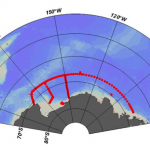 July 18, 2019 2:00 am
Published by Climate Extremes
July 18, 2019 2:00 am
Published by Climate Extremes
In this project, the selected student will use the satellite-based data obtained from the National Snow and Ice Data Center (NSIDC) to give an overall comparison of the sea ice variations in Arctic and Antarctic during the recent decades.
 May 23, 2019 12:47 pm
Published by Climate Extremes
May 23, 2019 12:47 pm
Published by Climate Extremes
CLEX researchers find strong correlation between ozone hole size and Australian summer temperatures. While there is no causal link between the two, the changes are driven by the same source - ocean temperatures.
 February 4, 2019 2:42 pm
Published by Climate Extremes
February 4, 2019 2:42 pm
Published by Climate Extremes
CLEX researchers propose that 21% of the heat carried across the Subantarctic Front south of Tasmania is achieved by long-lived, cold-core eddies entering the Subantarctic Zone.
 January 18, 2019 10:43 am
Published by Climate Extremes
January 18, 2019 10:43 am
Published by Climate Extremes
Antarctic sea ice extent underwent a rapid decline in the spring of 2016 and is still well below average now. CLEX researchers have tied the decline to natural variability of both the atmosphere and ocean in two articles published in Nature Communications this month.
 October 8, 2018 2:53 pm
Published by Climate Extremes
October 8, 2018 2:53 pm
Published by Climate Extremes
CLEX researchers find that ocean sea-ice models generally agreed on changes to average yearly cycle of freeze and melt in Antarctica, with dynamic processes dominating the sea ice edge and thermodynamic processes dominating the interior of the sea ice pack. However, the models disagreed about the trends of sea ice volume.
 August 3, 2018 9:25 am
Published by Climate Extremes
August 3, 2018 9:25 am
Published by Climate Extremes
For 67 days from early March to mid May, Taimoor Sohail was aboard the US Antarctic Program icebreaker, the Nathaniel B. Palmer, on a scientific expedition from Hobart to Punta Arenas in Chile. It was relentless but very rewarding work, scientifically and personally.
 July 15, 2018 1:00 am
Published by Climate Extremes
July 15, 2018 1:00 am
Published by Climate Extremes
When Chilean researcher Dr Erasmo Macaya from Universidad de Concepción and Centro IDEAL stumbled upon foreign kelp washed up on an Antarctic beach, he knew he had found something significant. Research by an international, multidisciplinary team of scientists reveals just how important that finding was.







